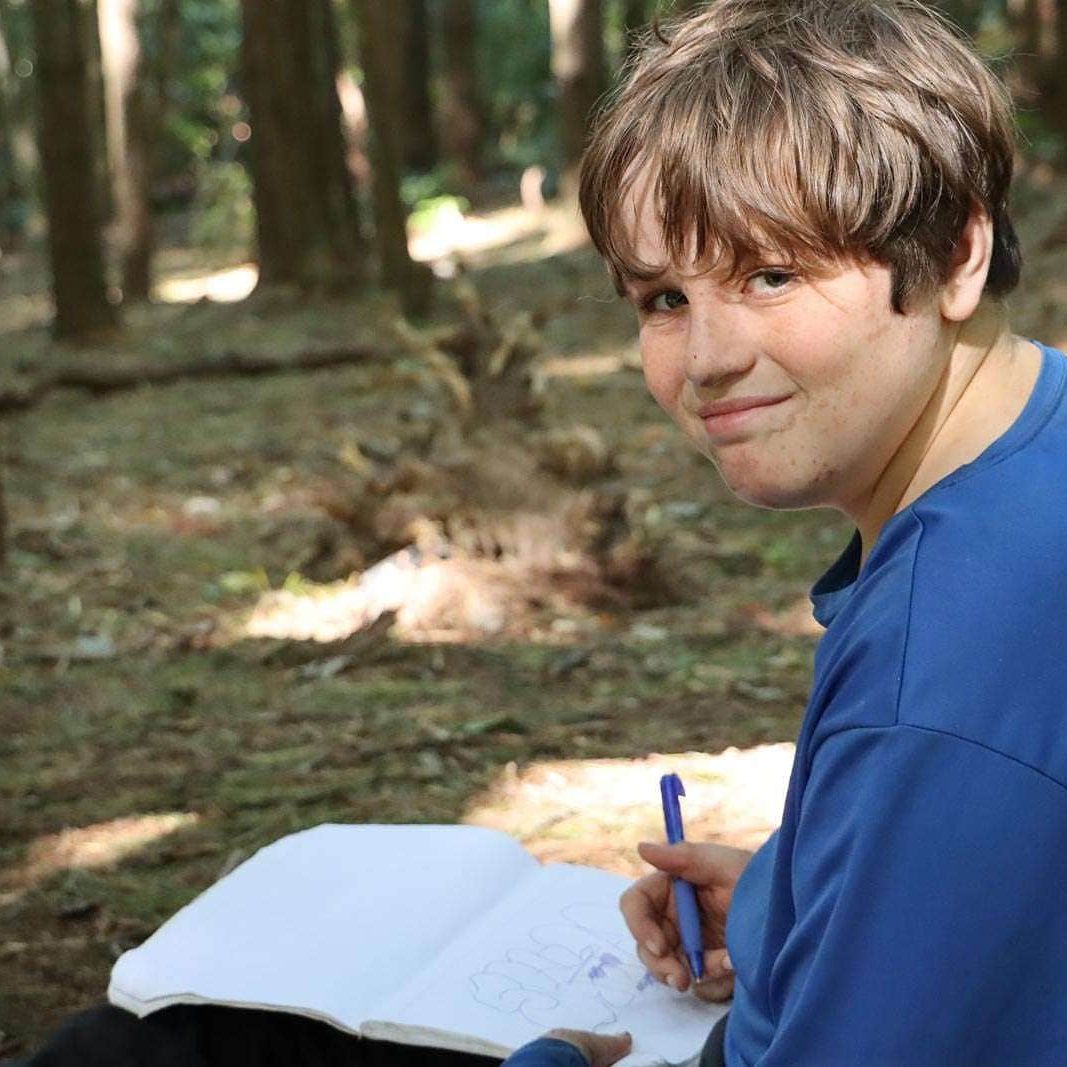We Offer Wilderness Therapy For Boys 14-17
Is your son struggling with a behavioral or emotional challenge? Do you feel like you’ve tried everything to help him but nothing seems to be working?
If you answered yes to either of these questions, then it may be time to consider seeking outside help.
Trails Carolina is a nationally recognized wilderness therapy program that provides struggling children and teens with immediate intervention and trauma-informed care from a team of expert mental health professionals.
90% of students showed improvement in Extremely Significant Symptoms of anxiety and depression 12 months after graduation
The Trails Difference: Segmented Peer Groups For High Quality Treatment
At Trails Carolina, we provide a safe, healthy environment for a variety of age groups to receive treatment. We offer wilderness therapy programs for preteen boys (10-13), preteen girls (10-13), teen boys (14-17), and teen girls (14-17).
We believe that segmenting groups by age and gender allows our team of mental health professionals, wilderness and adventure camp field instructors, and accredited education consultants to provide more focused and effective personalized care to each student.
Additionally, evidence shows that using segmented peer groups helps students learn to build positive relationships among their own peers. This makes the transition back to traditional school settings easier for young people. And it helps our students learn how to interact and build healthy connections for life.
Our boys 14-17 wilderness therapy program is designed specifically to meet the developmental needs of teen boys.
Our clinically proven methods work exceptionally well with teen boys who are struggling with:
Mental Health Disorders
We provide customized, evidence-backed therapies to address a range of mental health issues including depression, anxiety, and mood dysregulation.
- Depression
- Anxiety
- Mood dysregulation
Behavioral Concerns
Through our specialized treatment and experiential therapies, we guide students who are struggling with manipulative or defiant behaviors, anger, and aggression towards developing healthy coping mechanisms, fostering self-control, and cultivating emotional regulation skills.
- Manipulative behavior
- Aggression or anger management
- Defiant Behavior/Oppositional Defiant Disorder
Self-Image & Social Challenges
Our focus encompasses bolstering self-esteem and honing social skills while addressing concerns like social isolation, peer pressure, and poor body image.
- Low self-esteem
- Social isolation
- Bullying
- Peer pressure
Family & Attachment Issues
Recognizing the crucial role of the family in a child's life, Trails Carolina offers comprehensive therapeutic solutions for family conflict, challenges associated with adoption, and attachment issues.
- Family conflict
- Adoption challenges
- Attachment issues
Developmental Conditions
Through individualized therapeutic interventions, our committed team promotes the growth of essential skills, self-awareness, and social inclusion, creating a supportive and structured environment for progress for our students with developmental disorders.
- ADHD
- Autism and Asperger's Syndrome (high functioning)
- Pathological Demand Avoidance (PDA)
Academic & Learning Difficulties
Through our unique approach of merging therapy with experiential education, Trails Carolina addresses academic difficulties, learning differences, and school refusal, offering personalized academic support to each student.
- Poor academic achievement
- Learning differences
- School refusal
Behavioral Addictions
We acknowledge the complexity of behavioral addictions like gaming and technology obsession and provide tailored support and treatment strategies for students grappling with these issues.
- Video game obsession
- Technology addiction and obsession
- Substance use or experimentation
Our Wilderness Programs For Teen Boys
Getting Back On A Productive Path
When your child is on a dangerous and unproductive path that threatens their future, it is completely normal to feel scared, disappointed, and angry.
We understand the distress this causes your family, and have designed our adolescent program to address these issues and allow everyone involved to heal.
The results and testimonials from our alumni students speak for themselves. Just a few short months in a Trails Carolina wilderness therapy program can lay the foundation for a healthier, happier future for your teenage son, and your family relationships.
Our wilderness therapy program for teenage boys incorporates everything needed for your son to develop positive change in their emotional health: supportive peer groups, structured days, compassionate and boundary-setting adults, and a therapeutic process complete with a personalized wellness plan.
We incorporate proven therapeutic practices designed to address behavior problems and give your teen the tools to become aware of their negative behaviors, accept the natural consequences, and take action toward instilling positive coping mechanisms and habits.
This approach is especially effective with struggling teens because adolescence is a time of rapid brain development in preparation for adulthood.
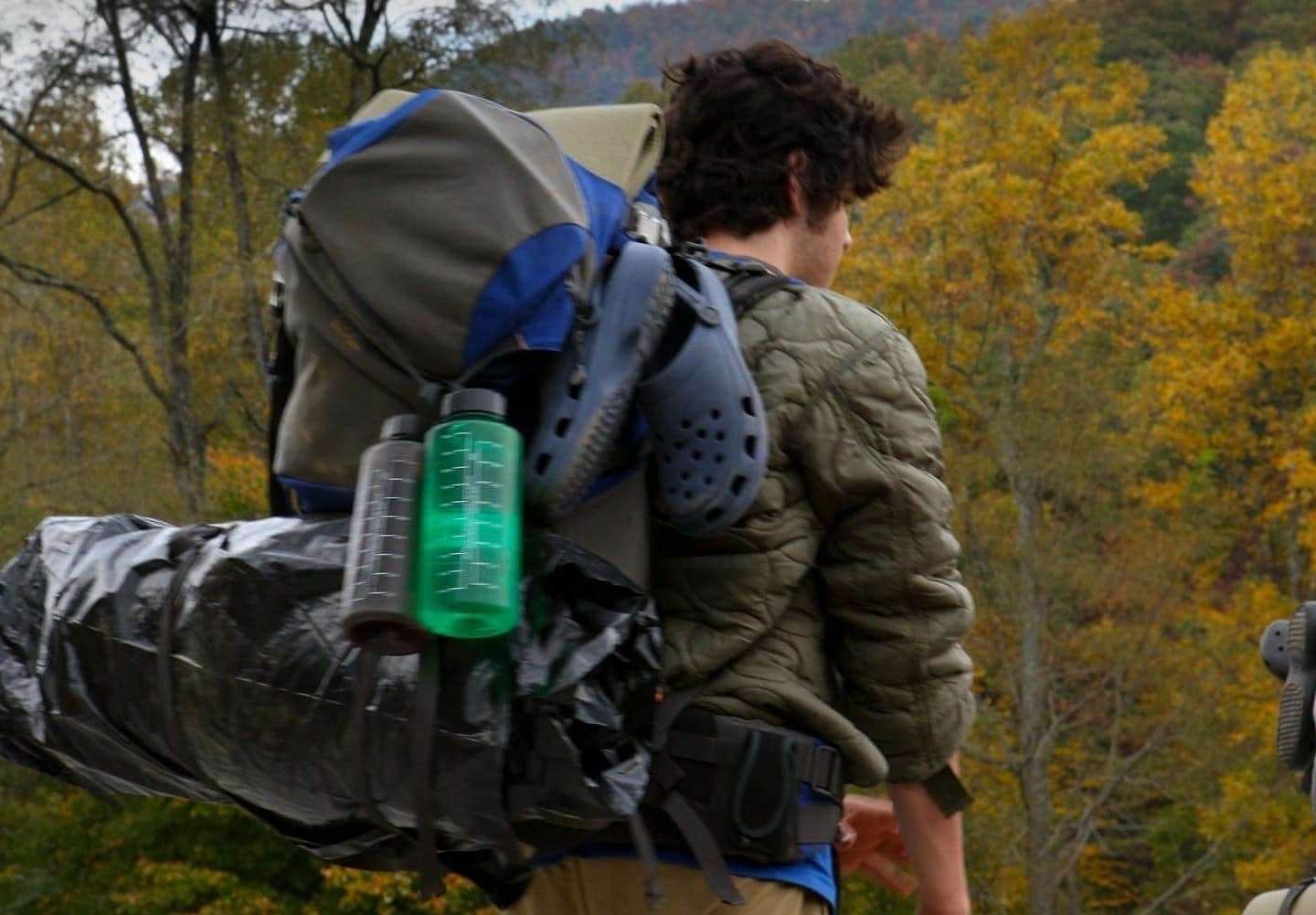
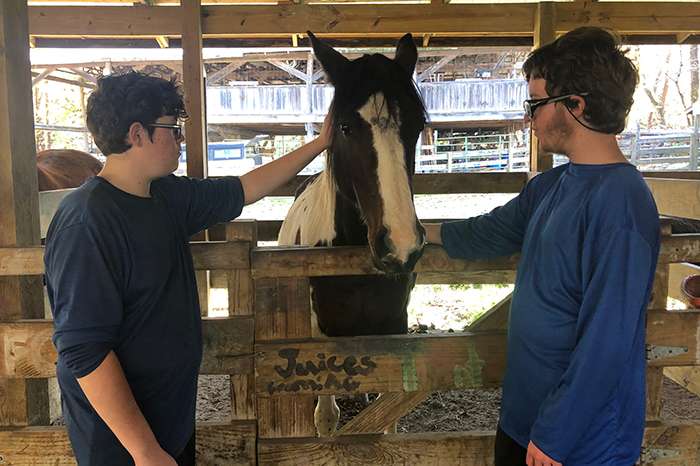
Helping Teenage Boys Express Their Emotions In A Healthy Way
It is common for teenage boys to feel pressure from society to suppress their emotions. Many troubled teens that we work with at Trails struggle with vulnerability and either don’t know how or have a difficult time getting in touch with and expressing their emotions in healthy ways. This often manifests as anger and anxiety.
To overcome this, our students learn to discuss issues and concerns in a healthy way, through wilderness therapy, group activities, and individualized clinical therapy.
If your son struggles with experiencing strong emotions and uses aggressive or violent behavior or outbursts in order to cope, wilderness therapy at Trails might be the perfect fit.
Throughout your son’s time at Trails, he will learn to dig into his emotions to uncover what is truly bothering him, and work to communicate and resolve the root cause rather than lashing out in anger. He will benefit from increasing his emotional vocabulary and identifying how certain emotions feel in his body.
Once he practices how to recognize his emotions and their root cause, he will learn how to best communicate his needs and boundaries with family members, peers, and authority figures in a healthy, productive way.
The Trails Carolina Promise
At Trails Carolina, we specialize in helping children and teens who are struggling with behavioral and mental health challenges such as anxiety, depression, ADHD, lack of academic engagement, substance experimentation and use, low self esteem, aggression, mood disorders, and trauma/PTSD. We focus on children and teens who can benefit from individual and group therapy sessions, and our family systems approach allows for parents and siblings to benefit and learn from the process, too.
By combining the trauma-informed care of our mental health experts with therapeutic wilderness programs in the natural environment of western North Carolina, Trails can provide the emotional safety and supportive environment that your child needs to break self-defeating patterns and achieve the lasting success they deserve.
The Trails Carolina mission is to help your child achieve social and personal growth, develop increased self efficacy and self awareness, form healthy relationships with family and peers, improve academic performance and communication skills, and become better equipped to combat chronic stress in everyday life and overcome challenges. The Trails promise is one of overall well being and positive change for the child and the entire family. Your child’s progress is our mission.
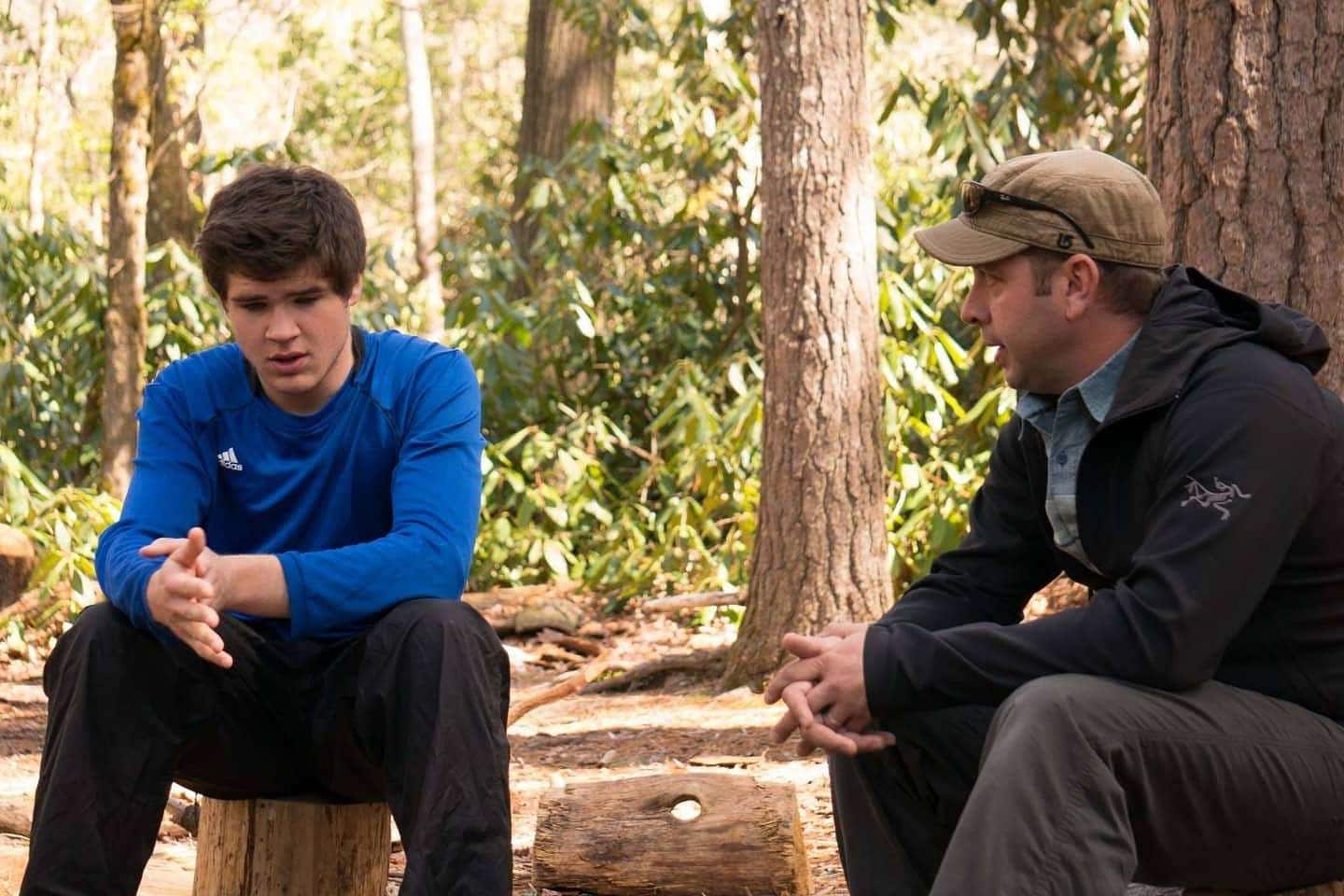
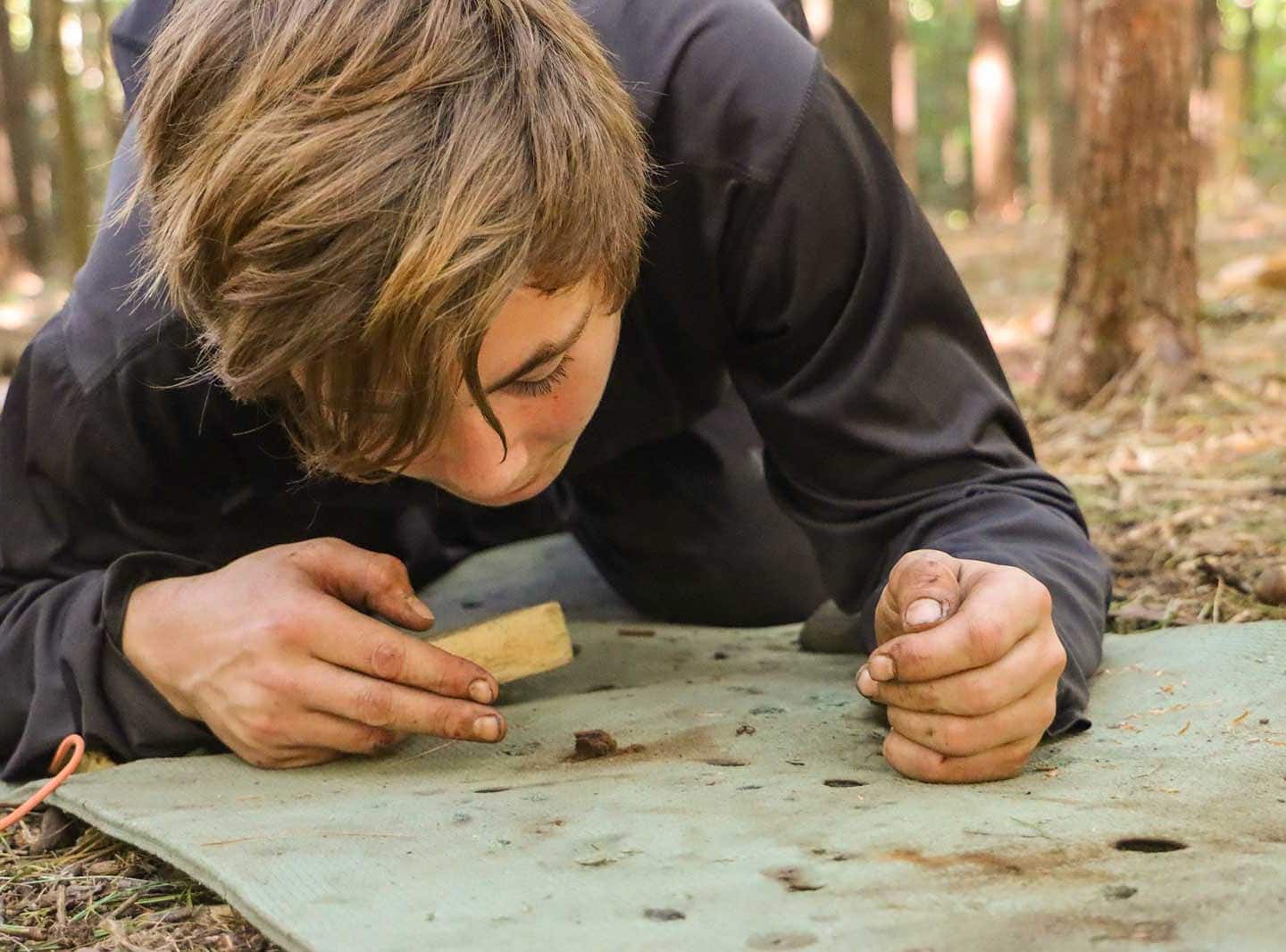
What will my son do at Trails?
When you enroll your son in a therapeutic wilderness program at Trails Carolina, the wilderness therapy process begins right away.
Upon arriving at the Trails Base Camp, our team of certified therapists and other mental health professionals will work with your son to devise a holistic, personalized treatment plan that we incorporate into every aspect of our wilderness therapy program. At our base camp, your son will stay up to date on schoolwork with the guidance of an educational consultant and accredited academic programs. The experiential education that your child will receive goes beyond the classroom.
Our wilderness therapy programs for boys involve a change in the environment that will help shift the students focus, which is often necessary for healing. Your child will be removed from their familiar environment and placed in a setting specifically designed to promote healing and lasting change. Trails Carolina provides care that is unique to the typical residential treatment center or therapeutic boarding school because much of the therapeutic process that your son will experience at Trails takes place in a wilderness setting.
The wilderness adventure therapy programming that is included in our wilderness therapy programs can involve wilderness living, experiential learning, backpacking, hiking, and other physical activities.
These adventure activities often require a group effort, which provides great opportunities to learn relational dynamics and strengthen interpersonal awareness, trust, and relationship building.
Get started today
Contact us today to learn how Trails Carolina can help your family
Trails saved my daughter’s life. Amanda is an amazing human and a brilliant therapist. I am so grateful to her, Science Steve, and the other wonderful people who could reach my daughter at a time when I could not.
Margot Lowman August 2022
Great life changing experience for our son. After becoming addicted to gaming during covid he was very depressed. At Trails he experienced the wilderness, Science Steve, learning survival skills and top notch therapy and support etc… I highly recommend! This gave our son and our family a renewed family bond full of love and excitement about his bright future.
Winnifred Wilson July 2022
Outstanding clinical work and superb staff! There’s a great culture at this company and it shows with how they engage with families/clients.
Kristin Brace June 2022
F.A.Q.’S
Being immersed in nature and away from all distractions allows for teens to have the opportunity to disconnect from the world and reconnect with themselves.
They can grow, learn, and not just survive, but thrive in the real world. Trails Carolina offers many benefits of wilderness therapy, including:
Personal, reflective growth: While at Trail Carolina, teens have the opportunity to better understand themselves.
This transformation, which takes place in the backdrop of the Blue Ridge Mountains can help them to be better about knowing themselves, understanding others and how their actions, words, and lives can impact others.
In the wilderness, these teens are allowed to take a step back, reflect and see the world from another’s point of view without any distractions.
Transferable life skills: Not only do teens learn hard such as how to pitch a tent, how to build and keep a fire going, as well as how to navigate through the wilderness, they also learn valuable life lessons which are transferable to the real world. Some of these include leadership, teamwork, respect, responsibility, and self-awareness.
Individualized therapeutic and academic programming: Individualized therapeutic programming is the crux of why Trails Carolina works so well. When the academics and therapy are specific to an individual, it creates an environment that is personalized which enhances learning.
Teens struggling with defiance may have different therapeutic methods for dealing with this than other teens who may be struggling with different problems such as anxiety.
Family-focused programming: One of the ultimate goals of Trails Carolina is helping to repair the family unit. While their son or daughter is away in the wilderness, some programs offer family therapy sessions that help both the parents and the siblings work through problems which the family has been struggling with.
When the focus is brought back to the family, it can ensure lasting change when the child transitions home from a therapeutic program.
“You must do the thing you think you cannot do” – Eleanor Roosevelt
If your son or daughter is struggling with behavioral, emotional, or mental health issues like defiance, anxiety, or depression and it has started to impact their day to day lives, now is the time to examine possible options for treatment for your teen.
Wilderness therapy programs, which are inpatient mental health treatment programs, can help child or teen explore what is troubling them, why they are acting out, and how they can better relate to their family and friends.
Removing teens from their hectic lives, technology, peers, bad habits, distractions, and influences is one of the many reasons why wilderness therapy programs work.
The best wilderness therapy programs offer an array of therapeutic techniques including, but not limited to equine relational programming, cognitive behavioral therapy, family therapy, group therapy, individual therapy, and mindfulness techniques.
Wilderness therapy programs accept students on a case by case basis. The selection usually depends upon the clinical programing of wilderness therapy programs and the behaviors exhibited by a potential student.
Some programs may accept teens dealing with more clinically complex issues while others chose to focus on students with more easily managed difficulties.
That being said, most all wilderness therapy programs provide therapeutic programming for struggling teens with behavior problems and emotional difficulties including:
Neurodevelopmental Disorders- These include Autism Spectrum Disorder (ASD), Nonverbal Learning Disorder, or Attention Deficit Hyperactivity Disorder (ADHD).
School refusal- Many teens entering wilderness therapy programs are struggling with school refusal problems. Which is why wilderness therapy programs are great for treating teens who refuse school, who are frequently truant, or even suspended.
Substance experimentation or use– While most wilderness therapy programs deal with substance abuse in some degree, there are some wilderness therapy programs which are specified to help treat teens who are struggling with substance use issues, whether that be alcohol or marijuana use.
Defiance– Whether this is disruptive behavior in school and at home, wilderness therapy programs can help get to the root of these problems and address these issues in teens. This may also include Oppositional Defiance Disorder.
Anxiety– Social anxiety or generalized anxiety disorder can be crippling for teens. It inhibits their functionality around peers, in the classroom, at work and with their family. Many wilderness programs provide help for teens struggling with some form of anxiety.
Depression– Depression can be tough, especially with teens which is why wilderness therapy programs offer therapeutic help to teens who are struggling with this.
We offer programs designed for pre-teens ages 10-13 and adolescents ages 13-17. Our clinically proven methods work exceptionally well with:
- Depression
- Anxiety
- Family conflict
- Low self-esteem
- Trauma
- Social isolation
- Self-harm
- Suicide ideation
- Adoption
- Defiant behavior/Oppositional Defiant Disorder
- Gaming and technology obsession
- Substance abuse
- Attachment issues
- Manipulative behavior
- Poor academic achievement
- Learning differences
- School refusal
- ADHD
- Mood dysregulation
- Autism (high functioning)
We are passionate about helping students overcome challenges and reach their full potential, and committed to creating the most effective wilderness therapy program possible for students and their families. Our entire team is honored to dedicate their professional lives to changing the lives of troubled teens.
The average stay at our wilderness therapy program is 70-90 days.
Trails Carolina is not a traditional summer camp. Instead, it is a wilderness therapy program that is designed to help at-risk youth overcome challenges and build the skills needed to achieve long-term success.
The program combines traditional therapeutic interventions with outdoor activities and wilderness experiences, such as hiking, camping, and team-building exercises, to create a unique and immersive experience.
Students at Trails Carolina receive individualized care and attention, with small group sizes and personalized treatment plans.
Our program is offered year-round! The program is typically longer than a summer camp and can last from several weeks to several months, depending on the needs and progress of each student and family.
While participants in Trails Carolina can benefit from the same sense of adventure and connection to nature that is often associated with summer camps, the program is specifically designed to provide therapeutic interventions and support for at-risk youth.
After graduating from our wilderness treatment center, students will typically transition back home or to a step down type residential program (Therapeutic Boarding School or Residential Treatment Center, as examples).
Parents have multiple weekly touchpoints at the program. There is a separate program specifically designed for the involvement of the family.
We also provide in-person opportunities during a student’s time at trails for families to get on campus and do work with their child. We have some of the highest-rated family services within the industry.
91% of students showed improvement in extremely significant symptoms of depression, 12 months after graduation.
Learn more: Does wilderness therapy work?
91% of students showed improvement in extremely significant symptoms of anxiety, 12 months after graduation.
Learn more: Treatment For Anxiety In Teens: How Wilderness Therapy Can Help
79% of students reported experiencing a decrease in suicidal thoughts, 12 months after graduation.

